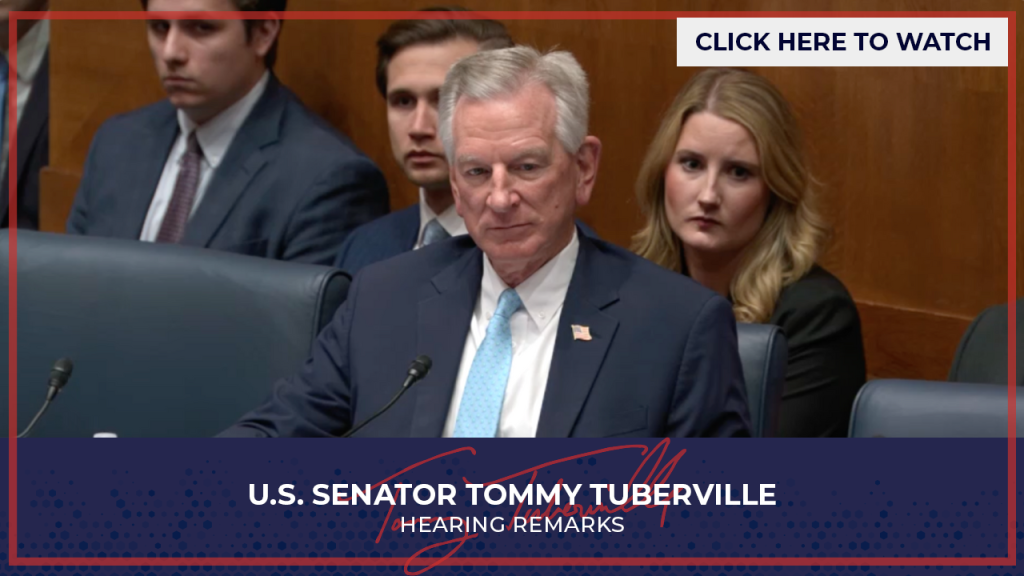WASHINGTON – Today, U.S. Senator Tommy Tuberville (R-AL) participated in a U.S. Senate Committee on Health, Education, Labor, and Pensions (HELP) hearing focused on registered apprenticeships. During the hearing, Sen. Tuberville spoke to panelists Dr. Latitia McCane, Director of Education at The Apprentice School, Mr. Gardner Carrick, Chief Program Officer for The Manufacturing Institute, and Mr. Josh Laney, Vice President of Apprenticeship and Work Embedded Learning at the Competency Based Education Network (C-BEN) about the successes of the apprenticeship model and how to continue improving the programs. As Chairman of the HELP Subcommittee on Education and the American Family, Sen. Tuberville is passionate about creating accessible pathways for students to fill high-demand jobs—especially in Alabama.
Read Sen. Tuberville’s remarks below or on YouTube or Rumble.

ON ALABAMA’S NURSE APPRENTICESHIP PROGRAM
TUBERVILLE: “Thank you, Mr. Chairman. Good morning, everybody. What an important hearing this is. Good morning, Mr. Laney. How are you doing? […] Mr. Laney, your apprenticeship program for nurses in Alabama is uniquely successful. And we’re at a national security risk now with our nurses, being a shortage. How come it’s so unique?”
LANEY: “Thank you for the question. I think the program in Alabama is unique mainly because it was built starting with the needs of the employers. We spoke with our Alabama Hospital Association, Alabama Nursing Home Association. They were the ones that were driving this because they are the ones that are feeling that pinch. They just don’t have enough people at the bedside to provide the service that they want to provide. They went and worked directly with our Alabama Community College system and our Alabama Board of Nursing.”
“I have found that our board of nursing, I didn’t know at the time but is much more progressive in their thought than a lot of the ones across the country. And our board of nursing created a nurse apprentice license that designates the scope of practice for that person so that, you know, you don’t have confusion about what is this person allowed to do or not do on the job. And because it was designed that way, employers are comfortable putting these people to work.”
“And they get a return on the investment that they’re making. We always say that apprenticeship is an employer’s investment in their people, and you don’t get a return on investment you don’t make. So, the employers are seeing that investment. They’re seeing the value add to that and they’re taking it up very quickly. So, we have the only statewide model now with over a thousand nursing apprentices, 87 employers, 28 colleges and universities.”
TUBERVILLE: “Most employers have skin in the game?”
LANEY: “Yes, sir. Every employer in Alabama has skin in the game. We have a, what we call, a ‘last dollar scholarship policy.’ So, we do not allow an apprentice to incur any debt for going through the training. If there’s a bill leftover after things like GI bill or WIOA or Pell or whatever gift aid we can find, we call that coupon hunting. We try to bring the price down as much as we can. If there’s a bill left over, it goes to the employers. And at first, we were kind of worried that they would balk at that, but they absolutely have not. They see the value in it, they pick it up, and they’ve run with it.”
TUBERVILLE: Thank you.
ON HOW FEDERAL GOVERNMENT CAN SUPPORT COMMUNITY COLLEGE SYSTEM APPRENTICESHIPS
TUBERVILLE: “Dr. McCane. Glad you’re here. Could you tell us about what we can do from the federal level to help with the community college system apprenticeships?”
McCANE: “Absolutely. I think one of the things that we need within community colleges [are] intermediaries to be able to go out and bring the businesses where they’re able to work with the community colleges. A lot of times the community colleges don’t have the bandwidth to be able to reach out to businesses. They have workforce development departments. They have people that are working in workforce development. But how do we ensure that what the small businesses need, especially around related technical instruction? A lot of your businesses don’t know what related technical instruction looks like. They know what on the job training looks like. But how can we get more of the infrastructure around community colleges? And that’s done through giving them those intermediaries to work with them.”
TUBERVILLE: “Thank you.”
ON REGISTERED APPRENTICESHIP MODEL
TUBERVILLE: “Mr. Carrick, you mentioned that in your testimony, 15% of the FAME students participate in registered apprenticeships. Can you speak on why employers choose not to register for the program?”
CARRICK: “Sure. So, when you look at the registered apprenticeship model it is designed with a lot of compliance elements to it. Manufacturers are able to design a program like FAME where they can work directly with the community colleges, they can recruit students, they can train them how they need, allow them to earn an associate degree, pay them along the way, and set them up to be global best, entry level, multi skilled maintenance technicians. And we don’t need the registered apprenticeship system in order to do that.”
“Now in some cases, in some states, the balance between cost and benefit falls in favor of registering the program. North Carolina is probably the best example of this, where the state offers a number of incentives that in the minds or in the evaluation of the employers that lead the program, they decide that participating in registered apprenticeship made sense in that case. So, it’s really an evaluation of the balance between the costs and the benefits. Unfortunately, at the federal level, that balance tends to be a little bit out of whack.”
TUBERVILLE: “Thank you. Thank you, Mr. Chairman.”
Senator Tommy Tuberville represents Alabama in the United States Senate and is a member of the Senate Armed Services, Agriculture, Veterans’ Affairs, HELP and Aging Committees.
###